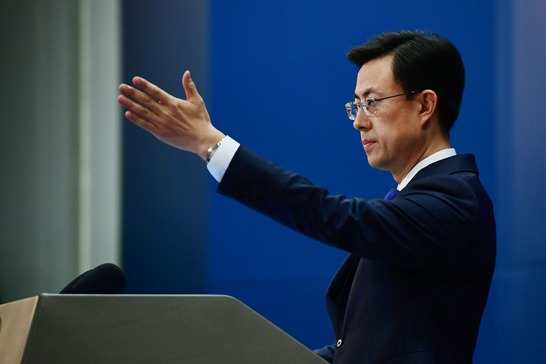Nations investing in each other's future

After decades of close cooperation, China and the UK well placed to face new challenges together

As Chinese people celebrate the 70th anniversary of the founding of the People's Republic of China and the nation pledges to further reform and open up, UK experts are optimistic that Chinese outbound investment to the United Kingdom should not be impacted, despite the new geopolitical environment of global trade frictions and the rise of unilateralism.
Christopher Bovis, a professor of international business law at the University of Hull, said one reason for such an optimistic view is that relations between China and the UK have been deeply rooted for decades and reflect an economic model of market access that has unparalleled application with other international partners and countries.
"The UK is the preferred choice amongst EU countries, attracting Chinese investments in excess of 5 billion pounds annually, mainly due to the accessible regulatory regime of mergers and takeovers, the less rigid employment laws and industrial relations frameworks, and the availability of a spectrum of investment opportunities," Bovis said.
The year 2019 is also the 65th anniversary of the establishment of China-UK diplomatic relations at the chargé d'affaires level.
Ties between China and the UK, especially business links, have grown increasingly strong and interdependent during the past seven decades.
Bovis went on to say China has many things to celebrate, not only its establishment but its economic performance and meteoric rise as a global superpower.
The participation of Chinese enterprises in the UK's economic development has continued to grow in recent years and China's net direct investment in the UK stood at $2.07 billion and the stock of Chinese direct investment in the UK was $20.32 billion in 2017.
Within the European Union, Britain is China's second-largest trading partner, its second-largest investment destination, and the second-largest source of actual investment. China is Britain's second-largest trading partner outside the EU.
Chinese companies' investments in the UK are not limited to financial services or shipping, but extend to technology, advanced manufacturing, infrastructure, and healthcare, crucial sectors in helping realize China's goal of creating a knowledge economy and improving Chinese citizens' quality of life.
He Shaowei, an associate professor in international business at the University of Northampton, said: "We have seen Chinese businesses engaging with a much wider range of industries compared to even just a decade ago. There are new forces and forms of collaboration emerging as well."
For example, in addition to the increasing collaboration at the national government and individual business level, there have also been surging interests from regions and cities in both countries to partner with each other.
From January to August 2018, the bilateral trade volume between China and the UK reached $51.05 billion. In 2017, trade between China and the UK amounted to $79.04 billion, of which, China's exports to the UK totaled $56.71 billion, and China's imports from the UK totaled $22.33 billion.
Financial collaboration has also grown rapidly as a result of China's capital account liberalization measures and the internationalization of the renminbi.
At the 10th UK-China Economic and Financial Dialogue, which was co-chaired by Vice-Premier Hu Chunhua and UK Chancellor of the Exchequer Philip Hammond, more than 500 million pounds ($628 million) of business deals were signed.
The long-awaited Shanghai-London Stock Connect was finally launched during the dialogue, offering more opportunities for British and Chinese financial institutions to invest in each other's economic development.
Mark Schaub, an international partner at King & Wood Mallesons, a leading Chinese law firm that specializes in UK-China investment, said: "China has been an important source of investment for UK business. We expect it can grow much more as the UK has leading tech in many of the sectors China is most interested in — autonomous cars, artificial intelligence, as well as for consumer-facing sectors, such as healthcare, pharmaceutical, creative, and education.
He said China has moved from investing in institutions to businesses that can leverage the Chinese consumer market.
"In a world of unilateralism and protectionism, China and the UK are two examples of countries that are looking to reducing barriers," he said. "In the short term, Brexit may complicate business for Chinese companies that have used the UK as a gateway to Europe. However, the UK is likely to retain its gateway role in the longer term and Chinese companies may even consider following the USA example of using the UK as a headquarters for beyond Europe, such as the Middle East and Africa."
The China-UK relationship faces a new situation and new opportunities as the world undergoes profound changes, with unilateralism and protectionism on the rise while economic globalization encounters a headwind.
Bovis said: "The UK government should emphasize the significance of China as a global partner in its long-term economic development planning. Sino-UK relations are on strong footings but need to be treated with reassurance and predictable reactions from the UK government."
Schaub echoed Bovis' view, saying the UK should continue its efforts to partner with China's businesses and be open to both receiving and making investments between the countries.
He said the Chinese government does not seek a preferential deal from the UK, but a fair one.
"Attempts to economically contain a country as large in China will not succeed in the long run. It would be counterproductive if the UK would leave one trading bloc — the EU — and then basically join a new bloc that is on an insular path," Schaub said.
He hopes the UK will adopt a more global approach that embraces a strong economic relationship with China and noted that it is heartening that the UK has kept an independent approach to date.
































